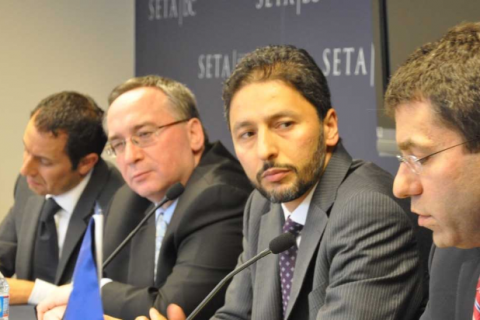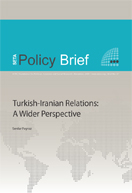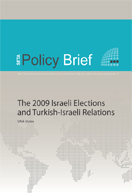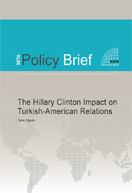Relations
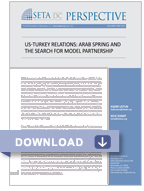
US-Turkey Relations: Arab Spring and the Search for Model Partnership
| Foreign PolicyThe Arab uprisings in early 2011 provided the US and Turkey with an opportunity and a necessity to discover new forms of cooperation and policy coordination due to the urgency for action on the ground.
-
Foreign Policy
Turkish-Israeli Relations and Regional Dynamics after the Palmer Report
By SETAFollowing the leak of the Palmer Report to the New York Times, Turkey declared that it considered the report null and reduced its diplomatic relations with Israel to the second Secretary level.
-
Domestic Policy
Turkish-Israeli Relations and Regional Dynamics after the Palmer Report
SETA-DC PANEL DISCUSSION Chair: Kadir Ustun, SETA-DC Speakers: Daniel Levy, New America Fnd. Stevn A. Cook, Council on F.R. Erol Cebeci,SETA-DC Date: September 19, 2011 Monday Venue: SETA-DC, Washington
-
Foreign Policy
Turkish-Israeli Relations and Regional Dynamics after the Palmer Report
SETA-DC PANEL DISCUSSION Chair: Kadir Ustun, SETA-DC Speakers: Daniel Levy, New America Fnd. Stevn A. Cook, Council on F.R. Erol Cebeci,SETA-DC Date: September 19, 2011 Monday Venue: SETA-DC, Washington
Bu Konuda Daha Fazla
-
Turkish-Iranian Relations: A Wider Perspective
By Serdar PoyrazTurkey might play a role in reintegrating the Iranian state into the international system. Turkey’s initiatives may have a moderating influence on the Iranian state and would, in any case, be a better policy route to choose rather than a direct confrontation.Turkey might play a role in reintegrating the Iranian state into the international system. Turkey’s initiatives may have a moderating influence on the Iranian state and would, in any case, be a better policy route to choose rather than a direct confrontation. It is a good sign for Iran and Turkey that the volume of trade between the two countries increased from $1.3 billion in 2002 to $10 billion in 2008. Iran is also be seen as a natural gateway by the Turkish state in order to reach into the markets of Central Asia and Pakistan. These kinds of Turkish political and economic initiatives will not only serve the interests of the Turkish and Iranian states but also have the potential to replace the aggressive military rhetoric of Western countries in dealing with Iran if the ultimate aim is to re-include Iran into the world economy and moderate its behavior. In addition, a more peaceful future for Iraq depends on reintegrating Iran with the rest of the world. Hence, the wiser course of action for western countries is to follow the Turkish example of engagement with Iran using diplomacy rather than issuing military and economic threats
-
A golden Era For US-Turkey Relations?
By Bülent ArasAfter back-to-back visits to Turkey by US Middle East envoy George Mitchell and secretary of state Hillary Clinton, Ahmet Davutoglu, a top adviser to Turkey's prime minister, predicted that Turkish-American relations were about to enter a golden era
-
The 2009 Israeli Elections and Turkish-Israeli Relations
By Ufuk UlutaşThe 2009 election results in Israel indicate that right-wing votes have increased remarkably, and that the center-left and left have lost one third of their combined representational power. Based on the results, although a few other coalition alternatives are numerically possible, two options seem most probable today
-
The Hillary Clinton Impact on Turkish-American Relations
By Tarık OğuzluThere is a new environment that Washington and Ankara may base their relations on dynamic, common interests rather than reified common values and norms.
-
A New Era in US-Turkish Relations?
By Ibrahim KalinLess than one week ahead of the US presidential election, Turkish-US relations and Turkey's role in its neighboring regions were the subject of a one-day conference organized by the SETA Foundation for Political, Economic and Social Research and the Brookings Institution in Washington, D.C.
